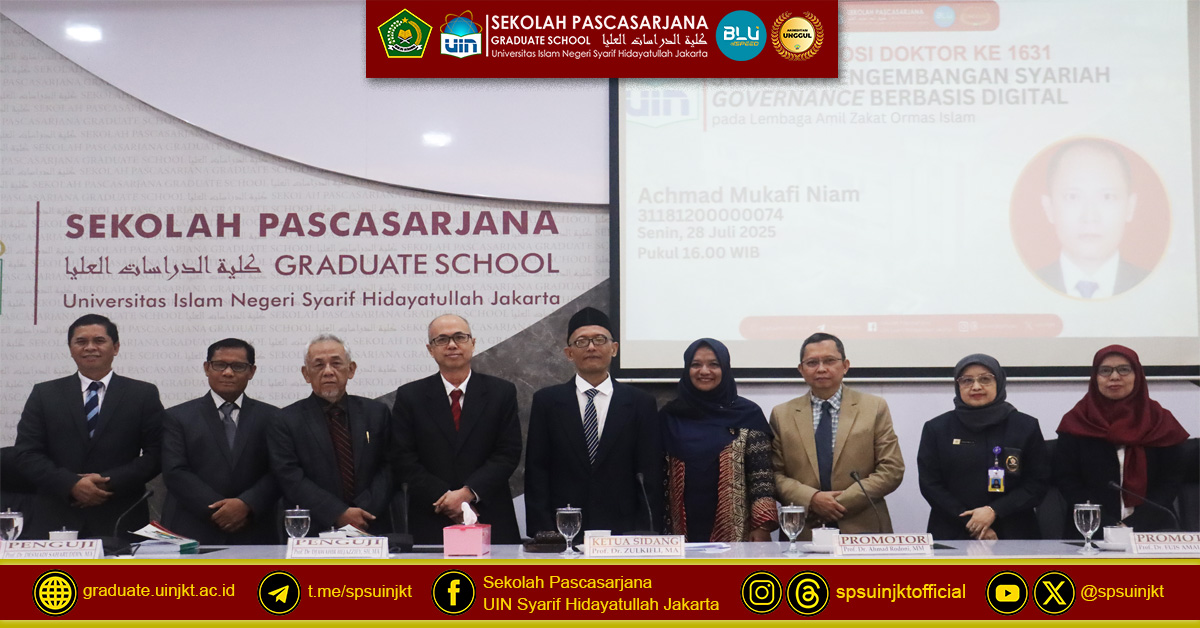Achmad Mukafi Niam Doctoral Promotion Exam, Digital-Based Sharia Governance Development Strategy at the Amil Zakat Institution of Islamic Organizations
Auditorium of Prof. Dr. Suwito, MA SPs UIN Jakarta, SPs NEWS: The Graduate School of Syarif Hidayatullah State Islamic University Jakarta held the 1631st Doctoral Promotion Exam in the Auditorium Room of Prof. Dr. Suwito, MA SPs UIN Jakarta, on Monday, July 28, 2025 with promovendus Achmad Mukafi Niam.
Achmad Mukafi Niam is a student of the doctoral study program in Islamic Studies with a concentration in Sharia Banking and Financial Management. Niam wrote a dissertation entitled "Digital-Based Sharia Governance Development Strategy in the Amil Zakat Institution of Islamic Organizations"
This research highlights the importance of optimizing digital accountability in the management of zakat by the Amil Zakat Institution (LAZ), an Islamic community organization (CSO).
This dissertation departs from the findings that the implementation of sharia governance in the framework of digital accountability in LAZ Islamic organizations is still not optimal. To overcome these problems, this research has three main objectives: to examine the application of sharia governance in digital accountability, to analyze the main challenges in the development of digital services, and to formulate the right development strategy. Achmad Mukafi Niam uses a sequential mix approach (quantitative-qualitative) to achieve these goals.
In its methodology, quantitative analysis is applied through the use of the Analytical Hierarchy Process (AHP) for weighting in website accountability content analysis, and the Kruskal Wallis test to analyze Instagram content engagement. Meanwhile, qualitative data was obtained through semi-structured interviews with 20 key informants. The strategy analysis was then carried out comprehensively using the SWOT, IFAS-EFAS, TOWS, and QSPM frameworks, resulting in an in-depth picture of the current condition of LAZ Islamic organizations.
The results of the study show that the dimension of sharia conformity is the most important aspect in the assessment. However, its implementation digitally is still limited and varies between institutions. The main challenges faced in the development of digital services include limited human resources (HR), budgets, and internal systems, plus external pressures such as increasingly fierce digital competition and cybersecurity risks. These findings provide a solid basis for the formulation of effective strategies.
Through SWOT–TOWS analysis and QSPM priority mapping, the resulting key strategies are value-based digital expansion and collaboration with fintech platforms. This strategy must also be accompanied by strengthening the network of mass organizations and increasing the capacity of human resources, as well as improving the digital security system that is in line with the principles of maqāṣid syarīʿah. This recommendation is expected to be a practical guide for LAZ Islamic organizations in facing the digital era.
The novelty of this research lies in three things. First, the integration of website and social media analysis as one zakat digital ecosystem, in contrast to previous research that tends to separate them. Second, the weighting of AHP-based website accountability. Third, the development of the Lovejoy & Saxton model with the addition of an educational dimension, which previously only included information, community, and action. This innovation provides a new perspective in the study of digital zakat.
The multidimensional implications of this study are significant. Theoretically, this study expands the scope of sharia governance and digital accountability studies by developing an accountability model on websites and social media based on da'wah values. Practically, an operational strategy was produced for LAZ to strengthen digital accountability through strengthening content, human resources, and sharia-based reporting systems. Policy implications include the urgency of developing national standards for digital zakat reporting, including open sharia audits, which will encourage a culture of transparency and public participation in the digital zakat ecosystem.
Achmad Mukafi Niam successfully defended his dissertation under the guidance of Prof. Dr. Ahmad Rodoni, MM and Prof. Dr. Euis Amalia, M.Ag, and was tested in front of a board of examiners consisting of Prof. Dr. Zulkifli, MA, Prof. Dr. Ahmad Rodoni, MM, Prof. Dr. Euis Amalia, M.Ag, Prof. Dr. Djawahir Hejazziey, SH, MA, MH, Prof. Dr. Kamarusdiana, MH and Prof. Dr. Desmadi Saharuddin, MA.
After paying attention to the writing of the dissertation, the comments of the examiner team and the answers of the promovendus, the examiner team determined that Achmad Mukafi Niam graduated with the title of Very Satisfactory. Achmad Mukafi Niam is the 1631st Doctor in the field of Islamic Studies, in the doctoral program of the Graduate School of UIN Syarif Hidayatullah Jakarta. (JA)

